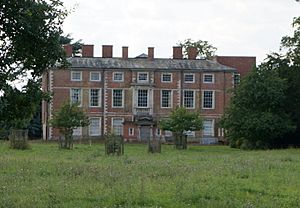Sir William Milner, 1st Baronet facts for kids
Sir William Milner, 1st Baronet (born around 1696, died 1745) was an important British politician. He came from Nun Appleton in Yorkshire. Sir William was a member of the House of Commons, which is like a part of today's Parliament, from 1722 to 1734.
Contents
Early Life and Family
William Milner was the oldest son of William Milner and Mary Ibbetson. His father was a successful clothing merchant in Leeds. He also served as an alderman and mayor of Leeds.
Education and Marriage
Young William Milner went to Eton College, a famous school. Later, he studied at Jesus College, Cambridge and at Middle Temple in 1713. This prepared him for a career in law or politics.
On December 5, 1716, William Milner married Elizabeth Dawes. Her father was Sir William Dawes, 3rd Baronet, who was the Archbishop of York from 1714 to 1724. A year later, on February 26, 1717, William Milner was given the special title of a Baronet. This meant he became "Sir William Milner, 1st Baronet."
Political Career
Sir William Milner became a Member of Parliament (MP) for York in the 1722 general election. He was part of the Tory political group. His father-in-law, the Archbishop, helped him get elected.
Key Votes and Changes
In 1725, Sir William voted against giving back lands to a politician named Bolingbroke. He was re-elected without opposition in the 1727 general election. After this, he changed his political side and started supporting the government.
He usually voted with the government. However, he did vote against them on two important issues. In 1729, he voted against payments for the King's household expenses. In 1733, he voted against the Excise Bill, which was a new tax on goods.
Speaking Out in Parliament
On February 9, 1732, Sir William spoke in Parliament. He complained about a clergyman who claimed to receive a large payment of £500 a year. Sir William stated that he would never accept any special job or payment while he was an MP. He wanted to make sure his opinions were always fair and unbiased.
Later Elections
Sir William tried to be re-elected in the 1734 general election, but he decided to withdraw before the final vote. He also ran in the 1741 general election but was not successful.
Later Life and Legacy
In 1728, Sir William Milner held an important position as the Grand Master of the English Freemasons. He passed away on November 23, 1745, in London.
Sir William and his wife had a son and a daughter. His son, also named William, inherited the Baronet title. This younger William later became the Receiver-General of Excise, which meant he was in charge of collecting certain taxes. He also served as the High Sheriff of Yorkshire.
 | Delilah Pierce |
 | Gordon Parks |
 | Augusta Savage |
 | Charles Ethan Porter |


